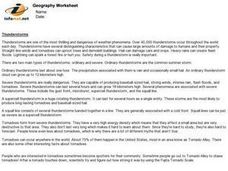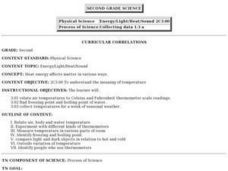Curated OER
Drink It Up!
Students investigate how the human body needs water by recording their water consumption for a day. They sing a song about drinking water, make and drink Kool-Aid and eat apple slices, and conduct an experiment to determine how much...
Curated OER
A World Of Matter
First graders complete a variety of experiments with solids, liquids and gases. They read books about matter, identify the characteristics of solids, liquids and gases and the sort and classify a variety of matter. Students make...
Curated OER
Thunderstorms
Fourth graders examine the attraction between two different charges to investigate lightning in a thunderstorm. They complete an experiment and a worksheet.
Curated OER
The Big Apple
This lesson has various activities that can be done simultaneously in groups or one at a time with the entire class. The activities center around New York and apples.
Curated OER
Heat Energy- Temperature
Second graders investigate the meaning of temperature. They determine what happens to a thermometer when the temperature rises or falls. They place thermometers in different classroom locations in order to compare the temperature in a...
Curated OER
Friction Faction
Students create an experiment. In this friction lesson plan, students review the concept of friction and complete a bottle roll activity. Students work in groups to create their own friction experiment.
Curated OER
Couch Potato or Inertia Victim?
Sixth graders how primary research is carried out. They design a simple survey questionnaire to interview people about their week average television watching time. They analyze the results and write a report based on the information.
Curated OER
Daily Survival Requirements of Water
Students will use inquiry science to complete an investigation. They create hypotheses predicting the changes water undergoes in becoming ice and determine how much ice needs to be melted to create one 8 oz. glass of water.
Hooda Math
Hooda Math: Balance Scales
Solve simple linear equations using a balance beam. Replicate the given equation by moving the blocks of X and 1 to the sides of the balance scale. Then use addition, subtraction, multiplication, and division to each side to solve for x.
PBS
Pbs: Balancing Scales to Solve Equations
Predict the number of blocks you need to equal the weight of one bag and then test your theory. This interactive exercise focuses on using critical thinking skills to add and subtract items on the scales to achieve balance and visual...
Math Cats
Math Cats: Math Cats Balance
Use this interactive activity to learn about weights, balance and basic mathematics. With problem solving and math skills solve the questions about how many objects will balance out on the interactive scales.
Illustrative Mathematics
Illustrative Mathematics: Which Is Heavier?
Students will learn the concept of weight by practicing weighing items on a balance scale and recording their results. Students can record their answers on the black line masters included in the Illustrated Mathematics lesson "How Heavy?".
Math Slice
Math Slice: Heavy Slice Special Test
A concise test for assessing number sense using weights and scales. Assessment is scored online offering students immediate feedback. Can be used for a quick assessment.
Math Is Fun
Math Is Fun: Balance When Adding and Subtracting
An interactive scale shows you how to deal with numbers and variables when solving simple algebraic equations.
Illustrative Mathematics
Illustrative Mathematics: Longer and Heavier? Shorter and Heavier?
Students will compare the length and weight of several pairs of objects to learn that weight and length are separate measurable attributes, and not always related.
Wyzant
Wyzant: Basics of Equations
This tutorial from WyzAnt contains a walk-through of the basics of solving algebraic equations. Examples are given and the tutorial ends with an interactive worksheet that contains an answer key.














